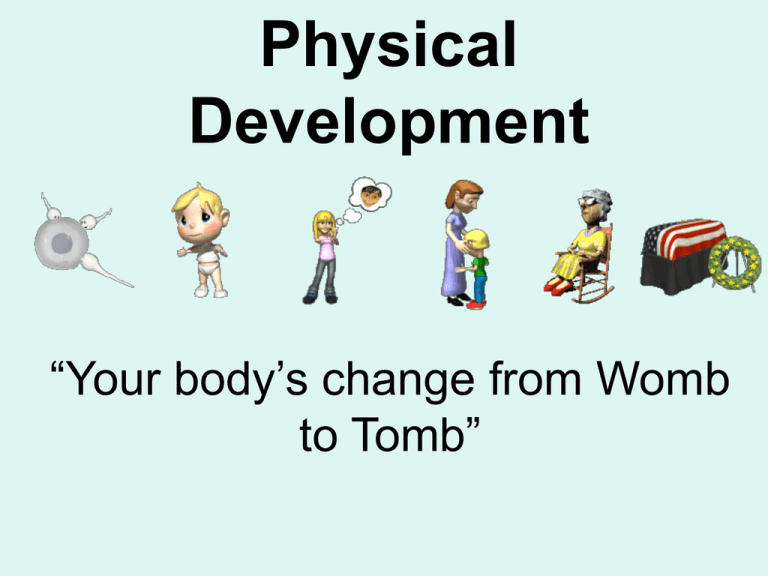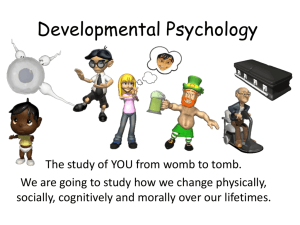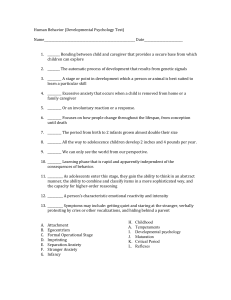
Physical
Development
“Your body’s change from Womb
to Tomb”
Prenatal Development
• Conception begins with
the drop of an egg and
the release of about 200
million sperm.
• The sperm seeks out the
egg and attempts to
penetrate the eggs
surface.
Prenatal Period – the time between conception and birth
Once the sperm penetrates the egg- we
have a fertilized egg called…
The Zygote
The first stage of prenatal development. Lasts about
two weeks and consists of rapid cell division.
The Zygote Stage
• Less than half of all zygotes survive first
two weeks.
• About 10 days after conception, the zygote
will attach itself to the uterine wall.
• The outer part of the zygote becomes the
placenta (which filters nutrients).
After two weeks, the zygote
develops into a
Embryo
The Embryo Stage
• Lasts about 6 weeks.
• Heart begins to beat
and the organs begin
to develop.
By nine weeks we have something
that looks unmistakably human…
A Fetus
The Fetal Stage
• Beginning after week 12
• By about the 6th month, the
stomach and other organs
have formed enough to survive
outside of mother.
• At this time the baby can hear
(and recognize) sounds and
respond to light.
Things that can go wrong in the womb
• Unfortunately, there are many things that
can go wrong when a baby is developing
in the womb or prenatal environment.
• Your placenta should act as a filter but
sometimes dangerous chemicals can
travel through the placenta and harm the
child
Teratogens
harmful agents to the prenatal environment
Fetal Alcohol Syndrome
Physical and cognitive
abnormalities caused by a
pregnant women’s heavy
drinking.
Severe cases symptoms
include facial disproportions.
Can lead to behavior and
learning problems
So what will a healthy newborn do?
We are not blank slates- we have some basic programming called reflexes
• Rooting Reflex
– a babies tendency, when touched on the cheek, to open mouth and
search for a nipple.
• Sucking Reflex
– the baby will suck on anything put in their mouth
• Grasping Reflex
– when something is placed in the palm of the hand or foot, the baby will
try to grab hold of it
• Moro Reflex
– when startled, the baby will flail out its arms and legs, then retract them,
making herself as small as possible
• Babinski Reflex
– when baby’s foot is stroked, he or she will spread their toes
Reflexes cont.
• Now, if the person next to you sticks their finger
in your mouth, are you going to begin sucking?
• Probably not, because reflexes go away with
brain development.
• Just as a side note these reflexes are different
from the ones you have when you touch a
burning pot
What else do babies do???
Babies also will turn towards human voices.
Gaze longer at human face like images.
Physical Developmental
Infancy and Childhood
How do brain and motor skills
develop in infants?
Good News
• While in the womb, you produce almost ¼
million brain cells per minute.
Bad News
• That is basically all you are ever going to
develop.
The Brain and Infancy
• Although the
brain does not
develop many
new cells, the
existing cells
begin to work
more efficientlyforming more
complex neural
networks.
Brain cells is an impoverished
environment.
Brain cells in an enriched
environment.
What does this mean for
humans?
If children from impoverished
environments given stimulating infant
care, they score better on intelligence
tests by age 12 than counterparts.
Use it or lose it
Maturation
• Growth processes that enable changes in
behavior, relatively uninfluenced by
environment.
– Such as walking or toilet training
• To a certain extent we all maturate similarly,
but the time can vary depending on the
person.
Motor Development
• Sequence is the same- but once again
timing varies.
• First learn to roll over, sit up unsupported,
crawl, walk etc…
Walking
• In US 25% learn by 11 months, 50% within a
week of 1st birthday, 90% by 15 months.
• Varies by culture
– if the culture emphasizes walking then babies can
walk at younger ages (NURTURE).
• But identical twins tend to learn to walk on the
same day (NATURE).
Toilet Training
• NO MATTER WHAT, THE
BABY NEEDS THE PHYSICAL
MATURATION TO HOLD HIS
OR HER BLADDER OR
BOWEL MOVEMENTS
BEFORE TOILET TRAINING.
• NO TRAINING WILL WORK IF
THE CHILD IS NOT
PHYSICALLY READY.
Adolescence
Physical Development
The transition period from
childhood to adulthood.
Physical Development
It all begins with…
Puberty
• The period of sexual maturation,
during which a person becomes
capable of reproducing.
Primary Sexual
Characteristics
• The body structures that make sexual
reproduction possible
I don’t believe I need to mention or
show pictures of these…
Secondary Sexual Characteristics
• Nonreproductive sexual characteristics
Female breasts
Widening
of Hips
Body
hair
Deepening of male voice
Puberty
Sequence is way more predictable than the
timing.
How might timing differences effect an adolescent socially?
Adulthood
Physical Development
Physical Changes
• All physical abilities
essentially peak by
our mid to late
twenties (this is why I
just miss being the
perfect female specimen)
Physical Milestones
• Menopause
– the natural ending of a woman’s ability to reproduce.
– Physical symptoms led by a lack of estrogen.
What psychological effects can menopause have?
Men do not experience anything like menopause.
Men can pretty much produce sperm forever.
Life Expectancy
Life
Expectancy keeps increasingnow about 75.
•Women outlive men by about 4 years.
•But more men are conceived 126 to 100.
Health
• Bad news:
– is as we get older our immune system weakens,
thus we become more susceptible to life
threatening ailments (cancer).
BUT…
• Good News:
– Is as we get older we build up a collection of
antibodies throughout the years, and get minor
colds less often.
Sensory Abilities
Age and Driving
• The brain processes information at
slower speeds.
Alzheimer’s Disease
• A progressive and irreversible brain disorder
– characterized by gradual deterioration of memory,
language and physical functioning.
– Runs its course in 5 to 20 years.
– Deterioration of neurons that produce the
neurotransmitter….
Acetylcholine
Estrogen supplements may stop the
onset of Alzheimer’s Disease.
5 Stages of Dying
1.
2.
3.
4.
5.
Psychiatrist Elizabeth Kubler-Ross
5 stages before dying
Denial – no freaking way this is happening to
me
Anger – how dare god let this happen – this is
BS!!!
Bargaining – just let me live to see my sons
get married
Depression – I can’t deal with this, what is my
family going to do without me??
Acceptance – I am ready, I don’t want to fight
this anymore
Chromosomal Abnormalities
Turner’s Syndrome
A baby is born with just a single X chromosome (girls)
Shortness, webbed neck and unusual sexual development
Klinefelter’s Syndrome
A baby is born with and extra X (XXY) (boys)
Minimal sexual development and extreme introversion
Down’s Syndrome
A baby is born with an extra chromosome on the 21st pair
Rounded face, shorter fingers, low cognitive ability
Turner’s Syndrome
Klinefelter’s Syndrome



